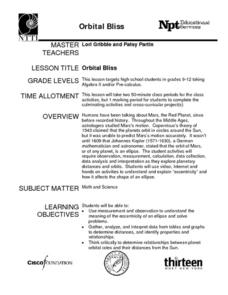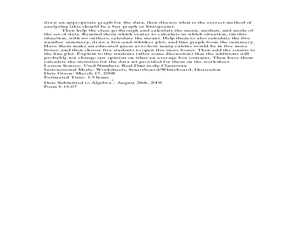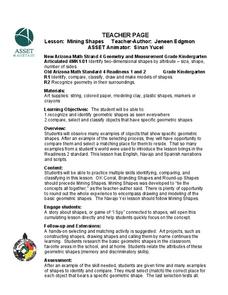California Education Partners
Theater Field Trip
Here's an assessment task that's better than watching a show. Young mathematicians solve word problems involving multiplication and division with equal groups. They must find the total number of attendees on a trip to a theater based on...
California Education Partners
Tile Mural
Paste this resource into your lesson plans like you'd paste a tile onto a mural. Given a diagram of a tile mural with rectilinear figures, future artists determine the perimeters and areas of the figures. They must then develop their own...
California Education Partners
Window Washers
Aim high with a task on window washers. An assessment task challenges learners to determine the number of windows two people wash. They do this using a given number of window rows on each side of a building. In addition, they find the...
Curated OER
Introduction to Time
Students explore the concept of time. Through discussion and artistic projects, they define time in their own words and tell how it is used to represent the seasons. Students draw a picture to portray time as it elapses during the...
Teach Engineering
Breathing Cells
Pairs work together to determine whether unknown solutions are either acids or bases by using a red cabbage indicator solution. After determining the general pH of the unknown solution, classmates blow into the same indicator after...
Curated OER
All About Me
Students examine who they are through the arts and sciences. They create a portfolio entitled, " All About Me."
Curated OER
Volume of a Rectangular Prism
Children use the length, width, and height of an object to calculate the volume of a rectangular prism. They observe how to multiply three numbers at a time, and define volume. Pupils observe as the teacher demonstrates how to determine...
Curated OER
Orbital Bliss
Most young mathematicians are aware that the planets don’t orbit the sun in a circle but rather as an ellipse, but have never studied this interesting feature. This resource looks at the planetary orbits in more detail and helps learners...
Futures Channel
Folding Circles
Students investigate properties of circles. In this geometry lesson, students differentiate between similarity and congruence as they observe polygons. They investigate properties of two and three dimensional shape.
Alabama Learning Exchange
Origami Geometry
Origami is an excellent way to combine Japanese culture, art, and geometric shapes into one engaging instructional activity! Scholars begin by listening to the story Sadako and the Thousand Paper Cranes and learn the origin of the...
Curated OER
Drawing Lessons
Students recognize and respond to the content of visual art using art vocabulary. They recognize the differences between art materials, techniques, and processes.
Teach Engineering
Fairly Fundamental Facts About Forces and Structures
Don't twist and turn looking for a resource. The first installment of a six-part series teaches young engineers about the five fundamental forces of compression, tension, shear, bending, and torsion. These forces help explain different...
Curated OER
What's The Weather?
Students explore the role that remote sensing plays in predicting our weather. Students investigate weather websites, and read about the three kinds of clouds. Students record and draw their observations in science journals.
Curated OER
Sequencing From Close To Far
Students explore how objects stay the same size and only "look" like they change when closer are farther from the object. They sequence aerial photos and satellite images from closest to farthest.
Curated OER
Seeing Is Believing
Students investigate the concepts of probability. They use data to find the central tendency, median, and mode. Students design and play a game in order to practice the concepts. They also complete a table with data that is analyzed.
Curated OER
Heartbeat Project
High schoolers enter information about their heartbeats into a spreadsheet. They construct data displays and calculate statistics. They describe and justify their conclusions from the data collected.
Curated OER
Connecting The Dots: Activities/Interests to Careers
Second graders complete the first and second sections of the Activity Sheet "New Things To Learn and Explore." They identify the Career Path that link them to careers using the link between those activities and interests. Students think...
Curated OER
Pendulums
First-time physicists experiment with pendulums in this physics lesson. They vary the weight of the bob, record how long each takes to complete ten period swings, and then calculate the time for one period. They repeat the procedure,...
Curated OER
The Pythagorean Theorem
Students research Pythagoras and learn how to apply his theorem. They solve real life problems using the theorem and demonstrate knowledge of exponents, equations, and radicals. Students include diagrams in their research papers.
Curated OER
Telling Time as an Everyday Use of Numbers
How can we estimate time? Have your young mathematicians make a clock. Then they compare and contrast types of clocks. They practice writing times in two different ways and make a book about telling time.
Curated OER
Raisin the Statistical Roof
Use a box of raisins to help introduce the concept of data analysis. Learners collect, analyze and display their data using a variety of methods. The included worksheet takes them through a step-by-step analysis process and graphing.
Curated OER
Hypatia: Angles
Introduce your young geometers to Hypatia, the first noted Greek female mathematician, and the properties of angles. Though this resource is missing worksheets that are needed to complete the instructional activity, the structure is...
Curated OER
Antacid Tablet Race
Young scholars complete experiments to determine how rocket fuel is affected by surface area and temperature. They compare the reaction rates of antacid tablets. They discuss their results to complete the lesson.
Arizona State University
Mining Shapes
Youngsters recognize and identify shapes. They draw, and use modeling clay to make shapes. They also identify shapes in their environment and in the Navajo culture, then compare the shapes and sort them into groups. This is the website...

























